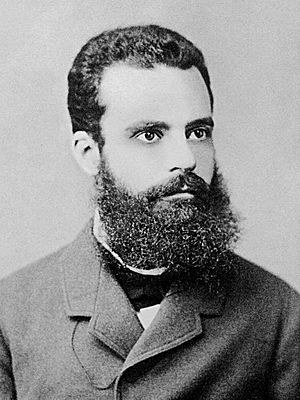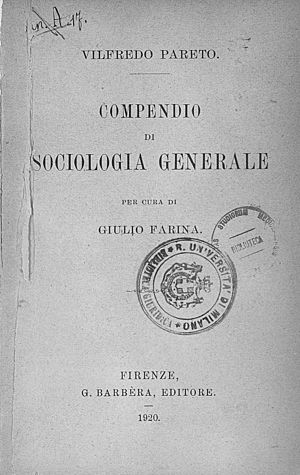Vilfredo Pareto facts for kids
Quick facts for kids
Vilfredo Pareto
|
|
|---|---|
 |
|
| Born |
Wilfried Fritz Pareto
15 July 1848 |
| Died | 19 August 1923 (aged 75) |
| Nationality | Italian |
| Institutions | University of Lausanne |
| Field | Microeconomics Socioeconomics |
| School or tradition |
Lausanne School Italian school of elitism |
| Alma mater | Polytechnic University of Turin |
| Influences | |
| Contributions |
|
| Signature | |
 |
|
Vilfredo Pareto (born Wilfried Fritz Pareto; 15 July 1848 – 19 August 1923) was an Italian thinker who studied many different subjects. He was a civil engineer, a sociologist, an economist, a political scientist, and a philosopher. He made important contributions to economics, especially in understanding how wealth is shared and how people make choices. He also helped make the word "elite" popular in social studies.
Pareto introduced the idea of Pareto efficiency, which is about making things as good as possible for everyone without making anyone worse off. He also helped create the field of microeconomics, which looks at how individuals and businesses make decisions. He was the first to notice that income often follows a pattern called a Pareto distribution. This pattern is a type of power law, meaning a small number of people have a large amount of something. The Pareto principle, also known as the 80–20 rule, is named after him. It comes from his observation that about 80% of the wealth in Italy was owned by only 20% of the people. He also contributed to the fields of sociology and mathematics.
Contents
Biography
Vilfredo Pareto was born in 1848 in Paris, France. His family was from Genoa, Italy, and his father, Raffaele Pareto, was an Italian civil engineer who had left Italy because of political reasons. His mother, Marie Metenier, was French. His parents named him Wilfried Fritz, but his name became Vilfredo Federico when his family moved back to Italy in 1858.
As a child, Pareto grew up in a comfortable home and received a good education. In 1869, he earned a degree in engineering from the Polytechnic University of Turin. His final project was about how solid objects stay balanced. This idea of balance later influenced his studies in economics and sociology.
From Engineer to Economist
After finishing his studies, Pareto worked as a civil engineer for several years. He worked for the Italian Railway Company and then for private companies, managing iron works.
He didn't start seriously studying economics until he was in his mid-forties. At first, he strongly supported classical liberalism, which means he believed in very little government involvement in the free market. In 1886, he became a teacher of economics at the University of Florence. During his time in Florence, he was involved in politics, often criticizing government rules. In 1889, after his parents passed away, Pareto changed his life. He quit his job and married Alessandrina Bakunina, a Russian woman.
Economics and Sociology Studies
In 1893, Pareto took over the Political Economy position at the University of Lausanne in Switzerland, where he stayed for the rest of his life. There, he published a textbook in 1896-1897 that described the Pareto distribution of wealth. He believed this pattern of wealth distribution was similar in all human societies, no matter the time or place.
In 1906, he made his famous observation that 20% of the people in Italy owned 80% of the property. This idea was later expanded by Joseph M. Juran and became known as the Pareto principle or the 80–20 rule.
Pareto was friendly with some socialists, but he thought their economic ideas were wrong. He later became suspicious of socialist leaders, believing they threatened the country. He also criticized the Italian government for not being tougher on worker strikes. As unrest grew among workers in Italy, he became more against socialism and democracy.
Pareto also turned to sociology to understand why his mathematical economic theories didn't always work perfectly in real life. He thought that social factors played a big role. He believed that many human actions are not purely logical, and that people often try to make their non-logical actions seem logical.
Personal Life
In 1889, Pareto married Alessandrina Bakunina. She left him in 1902. Twenty years later, in 1923, he married Jeanne Regis, a French woman, shortly before he passed away in Geneva, Switzerland, on 19 August 1923.
Sociology
In his later years, Pareto focused on his most famous work, Trattato di sociologia generale (1916), which was later translated into English as The Mind and Society (1935). In this book, he developed the idea of the circulation of elites. This theory suggests that ruling groups in society rise and fall over time. He famously said, "history is a graveyard of aristocracies," meaning that ruling classes eventually lose power and are replaced.
Pareto believed that many social actions are not based on pure logic. He thought that people are driven by certain "residues" (deep-seated habits and beliefs) and "derivations" (explanations or justifications for those beliefs). He observed that ruling groups often start strong and conservative, but over time, they become more focused on risk-taking. This can lead to problems, and then a new, more conservative group takes over.
Pareto's ideas about sociology influenced many thinkers, especially at Harvard University in the United States.
Ideas on Power and Society
Pareto believed that democracy was not truly what it seemed, and that a ruling class would always emerge and gain wealth. For him, the important question was how actively these rulers governed. He thought the government should be much smaller and welcomed Benito Mussolini's early rule as a step towards this idea, hoping it would free up economic forces.
Benito Mussolini, who later became the leader of Italian fascism, attended some of Pareto's lectures in 1904 when he was a student. Some people believe that Pareto's ideas about "elitism" might have influenced Mussolini's shift away from socialism.
Economic Concepts
Pareto became very interested in economics and supported free trade, which sometimes put him at odds with the Italian government. His writings showed that he believed economics was a lot like a mathematical science. He was a key figure in the "Lausanne School" of economics. His approach to understanding how the economy reaches a balanced state has influenced modern economic theory.
In his book Manual of Political Economy (1906), he focused on how individuals and businesses make choices to reach their goals despite limitations. He used "indifference curves" to show how consumers make choices, and he also applied this idea to how producers make decisions.
Pareto was the first to realize that economists didn't need to measure exactly how much happiness or "utility" a person got from something. Instead, it was enough to know if they preferred one thing over another. This idea helped start modern microeconomics. He replaced the idea of "the greatest good for the greatest number" with Pareto-optimality. This concept means that a system is working as well as it can when no one can be made better off without making someone else worse off. Pareto optimality is used a lot in economics and game theory today.
Key Economic Ideas
Several economic ideas used today are based on Pareto's work:
- The Pareto index measures how unevenly income is shared. He observed that in all countries and times, wealth is very unevenly distributed, with a few people holding most of it.
- The Pareto chart is a special type of graph used to show the most important causes of a problem, from largest to smallest. It's a visual way to show the 80–20 rule.
- Pareto's law describes how income is distributed.
- The Pareto distribution is a mathematical pattern used to describe Pareto's law.
- Ophelimity is a term he used to describe purely economic satisfaction.
Major Works
- Cours d'Économie Politique Professé a l'Université de Lausanne (in French), 1896–97.
- Les Systèmes Socialistes (in French), 1902.
- Manuale di economia politica con una introduzione alla scienza sociale (in Italian), 1906.
- Trattato di sociologia generale (in Italian), 1916.
- Compendio di sociologia generale, (A shorter version of Trattato di sociologia generale), 1920.
English Translations
- The Mind and Society, 1935 (translation of Trattato di sociologia generale).
- Compendium of General Sociology, 1980 (shorter version of The Mind and Society).
- Manual of Political Economy, 1971.
- The Transformation of Democracy, 1984.
- The Rise and Fall of Elites: An Application of Theoretical Sociology, 1991.
See also
 In Spanish: Vilfredo Pareto para niños
In Spanish: Vilfredo Pareto para niños
- Elite theory
 | Selma Burke |
 | Pauline Powell Burns |
 | Frederick J. Brown |
 | Robert Blackburn |


